- Home
- The Creativity Group
- Let Me Tell You a Story You Haven’t Heard Before: Setting up Global Online Storytelling Courses and Coaching
Let Me Tell You a Story You Haven’t Heard Before: Setting up Global Online Storytelling Courses and Coaching
David Heathfield is a world storyteller, teacher trainer and writer from Exeter, UK. He has authored Storytelling With Our Students and Spontaneous Speaking (both DELTA) and numerous articles and book chapters. He provides Creative and Engaging Storytelling for Teachers (CrEST) courses for worldwide participants on Zoom. He and his wife Tammy Heathfield have also set up Heathfield Creative English Coaching. www.davidheathfield.co.uk and www.heathfieldcoaching.co.uk
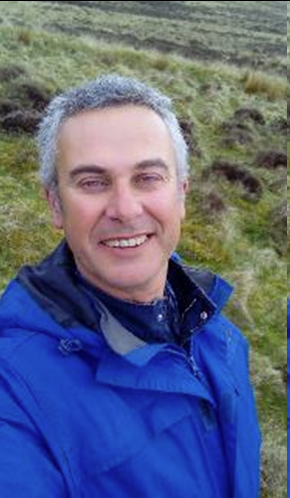
Storytelling and me
An old story has been passed down by word of mouth from generation to generation over tens, hundreds or thousands of years – it’s hard to know how it began. When it reaches your ears, you can choose whether to re-create the story by passing it on. You might spend time getting to the heart of the story, finding your own way of retelling it and then rehearsing it. Then each time you tell the story to others, you will be re-creating it for yourself, as well as in your listeners’ imaginations. This re-creating without reference to a written text is what sets storytelling apart from reading aloud. As Mario Rinvolucri says ‘If a teacher reads the story from a book, the page is often between her and the students. When she tells, she is a fountain and the words of the story gush forth from her. She and the story are one as the water is with the fountain.’
For many years now I have been supporting teachers of English who are interested in developing themselves and their students as storytellers. In 2004 I became a professional freelance storyteller and went from full time to part time in my job as a teacher of English. I have travelled around the world combining storytelling with learners of English of all ages with providing storytelling training workshops for teachers. This is a deeply satisfying endeavour as teachers discover not only that oral storytelling as a way of learning languages is joyful and effective but also that becoming a storytelling teacher comes much more naturally than they ever imagined possible. The focus for me has mostly been on sharing stories from diverse cultures around the world and the wit and wisdom inherent in these ancient tales. Because of the nature of my work I’ve had the opportunity to learn stories from teachers and learners from so many regions of the world It’s a constant delight to be encouraged to pass these stories on in an endeavour to make the world a better place. These old stories give us a chance to perceive our own lives, each other’s lives and the world around us from new perspectives and offer the possibility of change. Until relatively recently I’ve run training sessions in person mostly for teachers working in a particular region and this experience has been rich and fulfilling. However, apart from short workshops at international conferences such as IATEFL and the occasional global webinar, I never had the privilege to be able to run a course with teachers coming together from many different parts of the world and interacting together in real time.
Setting up the CrEST course
The story I want to tell you today is the latest episode in my life as a storytelling teacher trainer since 2020.
After a term of online teaching during the first lockdown of 2020 my wife Tammy and I were furloughed from our teaching jobshare. It was quickly evident that our long-term working arrangement would never resume, so we both made the decision to move on. My work as a storyteller and teacher training workshop leader had also come to a sudden stop, so the choice seemed obvious. Being very much a low-tech teacher and late adaptor when it came to using online tools, I initially considered the idea of setting up and running an online teacher training course daunting. However, I had started using Zoom and Padlet during the pandemic and saw that these seemed to be relatively easy for me as well as for the students to use and they proved to be fairly reliable tools. Based on my years of running training workshops I began to imagine the online course I wanted to offer teachers around the world:
- It would be for experienced as well as new classroom storytellers.
- It would be suitable for teachers working in any circumstances including low-resource contexts where class sizes can be very large.
- It would combine live Zoom sessions with asynchronous preparation and a mini-project the focus and depth of which would be in accordance with each individual participant’s circumstances.
- There would be a coaching approach with a strong focus on each participant developing in their own unique way.
- Participants would be encouraged to share stories with which they already felt a personal or cultural connection.
- An important feature would be learning from each other in terms of cultural heritage as well as from each other’s life and professional experience.
Although I have always worked in education as a TEFL teacher and storyteller, my work as a professional storyteller reaches across many fields including environment, heritage, entertainment and festivals, always with a strong focus on social inclusion and cultural diversity. I wanted to include participants whose work involves teaching in its broadest sense. In 2020 my involvement as a remote volunteer supporting teachers and young learners in Gaza, Palestine increased significantly because of lockdown, so I decided to fully fund two places for Palestinian teachers working in Gaza. To my delight and surprise all twelve places on that first course in July 2020 were filled. Along with TEFL teachers from Gaza, the UK, Croatia, Spain, Argentina, Canada/Portugal and Nepal, that first course welcomed a primary school teacher from Singapore, an Egyptian teacher of Arabic who lives in the Netherlands, a Turkish academic researching folklore and a professional storyteller from Italy. Some were young early career teachers and most were mature and highly experienced including five who were actively involved in teacher training and development. This rich and diverse mix has continued to be a feature of the online community of people who have done the course.
We all met for six two-hour live Zoom meetings in the middle of my day here in Exeter, UK to allow people to come together across time zones and celebrate the joy of storytelling across cultures. I called the course Creative and Engaging Storytelling for Teachers and Mindy Neo, a participant from Singapore, quickly shortened it to CrEST. The name stuck and the image of us all being carried aloft on the crest of a wave and surging forward together is never far from my mind.
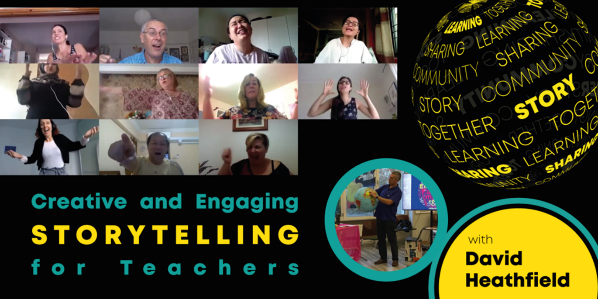
Participants passing on learning
From the first CrEST course onwards the evaluation comments have affirmed that the nature of the course suited the participants. On completion of that first course Sikha Gurung wrote “I am a Senior English Language/Arts teacher at Ullens School, Lalitpur, Nepal and a Visiting Faculty for MEd program at Kathmandu University School of Education. I cannot thank you enough for the overall learning and sharing experience. I had never done a course before which did not feel like a course at all. It was so engaging, a truly flawless course which has helped me socialize with so many literally amazing storytelling teachers from around the world. I learnt so much from their own unique ways of telling stories. Thank you for introducing me to this wonderful art of storytelling and helping me grow with it. Storytelling is indeed for, by and of humans and their societies.”
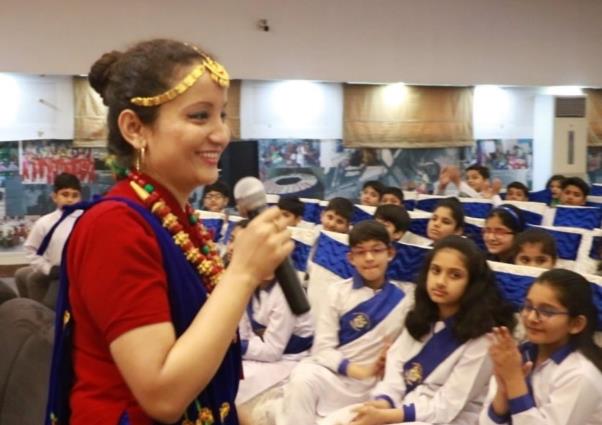
Sikha Gurung from Nepal on a storytelling visit to school students in Pakistan
Sikha went on to provide storytelling training for her colleagues, as have so many of the CrEST course participants. In fact one of the most striking results of the course has been the determination of participants to pass on learning to colleagues locally, nationally and, in some cases, internationally in the ensuing months and years. Many have expressed a desire to transform the way English is learned, placing greater emphasis on creativity and sharing.
Profesora Doctora Vera Cabrera Duarte from the Catholic University of São Paulo is another CrEST participant who is now putting storytelling at the heart of her work developing language teachers. She writes:
“As a teacher of English and as a researcher, I have found out that in language learning, storytelling has proved to build confidence in developing language skills, as well as increase motivation and interaction in the classroom situation. From a cognitive viewpoint, stories are responsible for fostering motivation, focus and attention. From an affective perspective, empathy as a Facilitating Attitude, can be exercised spontaneously through storytelling.
This year, with all this in mind, I started a new project together with Professor Elizabeth Pow: Storytelling: Engaging and Learning, and we have been working with students from Catholic University of São Paulo and São Bernardo do Campo Faculty, with undergraduates taking a teaching degree in English and Portuguese languages.”
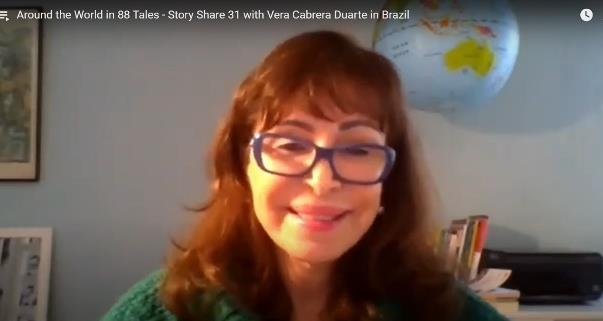
Dr Vera Cabrera Duarte storytelling globally online as part of Around the World in 88 Tales
It's hard to express the sheer joy of a CrEST course. The course feels like an intercultural coming together of hearts and minds, a celebration beyond borders, a free and creative sharing of wit and wisdom from around the world.
Dealing with online connection challenges
Of course there are occasional challenges for participants doing online courses. One of the more common ones is having a reliable internet connection. The live CrEST sessions and short one-to-one tutorials happen on Zoom which is generally agreed to be more reliable than its rivals and works fine on a smartphone where a computer is unavailable. Every live session is recorded and shared privately with participants soon after the session ends. However, because the live sessions mainly involve activities both in the main room and in breakout rooms, the recording acts best as a way of reviewing the session and is hardly a substitute for the live experience.
Ongoing impact on participants and their learners
So far there have been sixteen CrEST courses with a total of160 participants around the world. From here in the UK I can see course participants in every direction. I look west to Peru and California, east to Singapore and South Korea, north to Scotland and Northern Ireland, south to Angola and Tanzania and to so many different countries in between.
Rike Fischer, a secondary school English teacher in Wiesbaden, Germany writes:
“David Heathfield's CREST course has impacted my lessons enormously.
I use stories in the classroom more often now, and my presence as a teacher has become more pronounced and motivating for my students because I make my lessons more illustrative and personal. Any chance of acting out situations or stories is grasped, and the students love it. We laugh more. We play more games. We've all come to appreciate stories more.
Many students listen attentively with their eyes closed and allow themselves to be taken in by the story. I wasn't able to do that before the training.
When I actually have the time to do a set of lessons working on one story and using different personal response activities as well as acting out parts of the story, the students - especially year 6 - are highly motivated, and absorb the English words and phrases effortlessly.”
Rike Fischer
It's always fascinating to find out what teachers do with what they have learned while doing the CrEST course, especially those working in contexts which are less familiar to me. Lone Bendixen Goulani, originally from Denmark, is a lecturer in the School of Science and Engineering, University of Kurdistan Hewler, Kurdistan Region, Iraq. She places great emphasis on her young adult students, many of whom have had traumatic life experiences, being able to share their own personal stories. During the CrEST course she designed a project for her students which included them responding to her telling a regional folk tale. She subsequently put the project into action with her students:
“All my Computer Engineering students participated. They presented a story in class for each other. This was a graded assessment. It’s the best week of the whole year when I get to listen to about 100 wonderful personal narratives. The aim of the assignment is for students to become aware of pathos – the emotional appeal through story telling in public speaking.
Incorporating folktales in the module was a new way for me to trigger the students’ memories. Normally, we only use other narratives by other students, mobile phone pictures or objects. Students reflected on our work with rhetorical appeal after their storytelling week. Some mentioned that the story they decided to tell was directly inspired by the folktale I told. Most students, however, seemed to be inspired by other students’ personal stories.”
Lone Bendixen Goulani
Here are video testimonials from people who have done the course, are now part of the CrEST community and would like to share their experience of the course with you: Sue Piper (England), Pedro Lukeba (Angola), Jackie Ross (Scotland), Evi Karydi (Greece), Maria Teresa Continanza (Argentina), Amna Burki (Canada/Pakistan), Simona Stambazzi (Italy), Alan Marsh (Malta/Italy/UK) https://youtube.com/playlist?list=PLj-mcWeMmSZw8RewyhE1MjJeCC-LIMg6E
Further storytelling courses
The CrEST course is short and intensive and many participants finish the course wanting to explore further. Already in late 2020 I ran the first Beyond the CrEST course exclusively for participants who had done CrEST. Here the focus is on different ways that teachers and students can find and learn a story to tell. Self-directed peer coaching with a strong emphasis on support and sharing is a significant feature. One of the first teachers to do this follow-up course was Sahar Siyam, a teacher who runs a drama club for teenage learners in Gaza: “This course was the shifting point through my journey. Building my self-esteem to tell stories and then coaching others to tell stories wouldn't be achieved without being part of this course.”
Simona Stambazzi, a young storytelling teacher in Italy, found doing the courses life-changing: “Taking the CrEST course has completely changed my way of teaching and my life in general. I was very lucky to have my first encounter with using oral storytelling to teach English after just slightly more than a year since I had started my career as a teacher.
It was the first step to understand what it means to tell a story and prepare to tell a story, to gain confidence and experiment in a safe space where everyone is learning. Moreover, taking the CrEST course, you become part of an amazing community of teachers and storytellers from all over the world who support each other and care about each other.
During both CrEST and Beyond the CrEST courses, part of my projects was to use storytelling during my lessons as much as I could, but still following the school programmes. This gave me the chance to understand how to use storytelling in different ways, with different levels and age groups, and with different goals (for example, to introduce a grammar point, to generate discussion, to work on vocabulary…). Receiving feedback on what I had done and being encouraged to continue was really important for me, and to find the motivation to keep going, experimenting and hone my skills.”
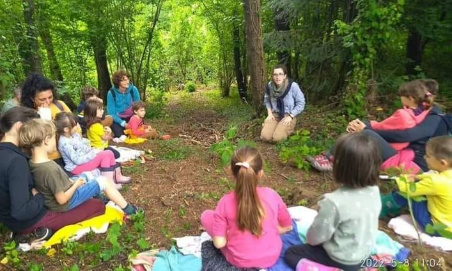
Simona Stambazzi storytelling in the forest
Creative coaching
More recently my wife Tammy Heathfield and I launched our joint venture Heathfield Creative English Coaching and ran our first online course together Sharing Our Stories: Personal and Creative Storytelling and Drama Activities for Teachers. Again it made a significant impact on participants, most of whom had already done the CrEST course.
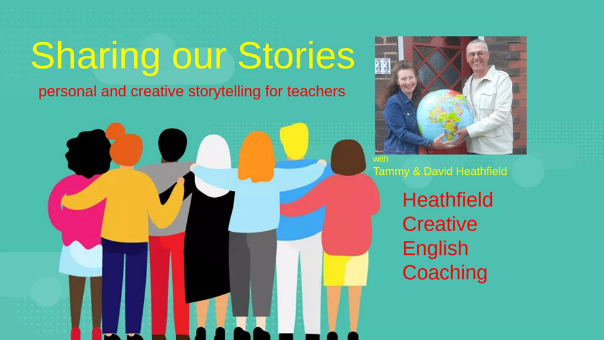
Participants on the first Sharing Our Stories course
Georgia Pieri, a teacher and school owner from Cyprus wrote “This course broadened my horizons in personal storytelling and it boosted my confidence and my ability in narrating stories that I had never really thought about. It made me feel respected and it also increased my self-esteem. Personal stories are completely new to me as I have never shared a personal story with other people before. I am planning to use personal storytelling in my classes with my students as I am convinced that it will change the perspectives of my classes and that it will bring harmony and unison in my lessons.”
Georgia Pieri storytelling with young learners
One-to-one storytelling coaching for teachers is another development which has come about through demand from people who have done CrEST. This is rooted in my long-standing person-centred approach in my teaching work. Facilitating the storytelling teacher’s learning and development by helping them to identify what works for them and to set themselves challenging, motivating and achievable goals are key components of storytelling coaching. Evi Karydi is the owner and Drama and Storytelling Academic Director at iLearn Language School, Greece as well as the Drama and Storytelling Educational Material Designer at DramActivate. She writes:
“The coaching with David is extremely beneficial for me because it helps me explore my potential as a storyteller. It keeps me in the 'growing zone“. Whatever I learn and try during the live coaching, I immediately try to use with my students. In this way I put theory to practice and I make stronger connections with the techniques, which gives me an air of "storytelling confidence". I also have the chance to discover what further adjustments and adaptations I need to make in my storytelling strategies depending on my students. This too helps me evolve and reinforces my confidence. David has adeptly crafted every session so that it resonated with me. I feel that with his help and guidance I was able to find my own storytelling identity.”
Evi Karydi
Tammy and I welcomed Georgia and Evi into our home in July 2023. They were the first Heathfield Creative English Coaching storytelling teachers to do a homestay course with us and it was a delightful experience.
Evi Karydi: “My homestay coaching with David and Tammy was the perfect combination of absolute professionalism and heartfelt hospitality. The morning sessions were well-planned, offered hands-on experience and exceeded my expectations BUT our learning didn't stop there. We took our educational adventure everywhere we went: to the cliffs, to a castle, to a pub, to a party. This is definitely a story that no educator would want to miss.”
Georgia Pieri: “Staying with Tammy and David and being coached by both was one of the best experiences I have had in my whole educational life. The activities and the stories were amazing and can be modified in any classroom. It is a homestay coaching experience that I highly recommend to all.”
This latest chapter has begun and the story has a long way to go. We’re full of anticipation.
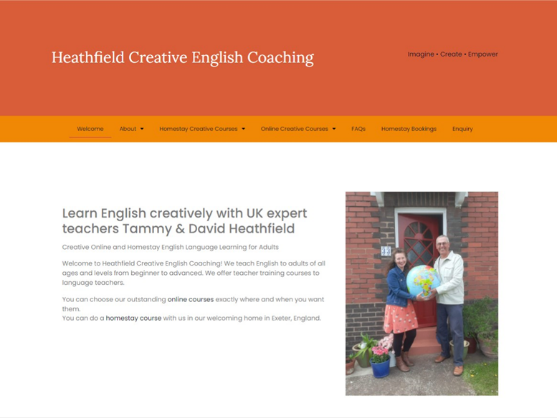
Including teachers from Africa
I have always loved traditional storytelling in Africa and especially the way that listeners often tend to tell the story in tandem with the storyteller. It was noticeable that no participants from Africa joined the first six CrEST courses, so in early 2021 I contacted Dr Harry Kuchah Kuchah who plays a significant role in supporting the development of African teachers of English through ELTA Africa. He is himself a storyteller who advocates for storytelling in language education: “To achieve global understanding and citizenship we need to encourage our students to be firmly rooted in their cultures while opening up to the rest of the world and storytelling is an essential tool in this.” (For the Love of Stories, Africa ELTA Newsletter, February 2023).
Dr Harry Kuchah Kuchah at the ELTA Africa storytelling webinar
I have been able to provide a place on every global CrEST course since March 2021. In collaboration with Harry Kuchah Kuchah I have been able to invite eight African participants. The main criteria for selection have been an interest in storytelling, availability and motivation to complete the course and, most importantly, being in a strong position to pass on learning to colleagues locally and regionally. Rasheedat Sadiq from Nigeria is a prominent teacher trainer and academic coordinator who also runs a voluntary children’s mobile library service in parts of Abuja where there is the greatest need. She became the first African CrEST teacher. She has been followed by Geraldine Nanjala, a global prize-winning school teacher and librarian from Kenya, Sikhumbuzo Sibanda, President of the South African Teachers Association, Jacques Dossa, a creative young storyteller, poet, musician and teacher from Benin, Mwanaidy Mwacha from Tanzania, Pedro Lukeba from Angola, Mara Filipe from Angola and Augustina Mtui from Tanzania. Such has been the success of these teachers’ participation that, with Harry Kuchah Kuchah’s support, together we did an incredibly uplifting and dynamic Africa ELTA/CrEST storytelling webinar via Zoom titled ‘Telling Folktales to Engage Young People in Africa’ reaching and inspiring hundreds of influential teachers in Africa and further afield.
In her February 2023 Africa ELTA Newsletter report titled For the Love of Stories, Rasheedat Sadiq wrote “The impact of the (CrEST) training has been phenomenal for the teachers and for their learners. In keeping with the spirit of Ubuntu, it was deemed necessary to share some of the skills and knowledge from the CrEST course with a wider audience and thus Africa-ELTA hosted the highly engaging webinar titled Telling Folktales to Engage Young People in Africa on the 10th of October 2022. The event, which was attended by hundreds of teachers globally via the Africa-ELTA Zoom and Facebook platforms, was a truly international one. You, your colleagues and your students can enjoy and learn from the recording of the event here: https://www.youtube.com/watch?v=aJrgBvPGDjo&t=29s ”.
Rasheedat Sadiq
Large-scale events like this one and more intimate sharing sessions for local colleagues are an ongoing legacy of CrEST. The passing on of learning is as fundamental to CrEST as the passing on of oral stories.
Commissioned CrEST Courses
Not all of the CrEST courses have been for participants coming together from around the globe. The first commissioned course was for Turkish primary school teachers, the second was for teachers at International House Milan and the most recent CrEST course was organised by the Dau Dau project, winner of the 2022 ELTON for Innovation in Language Teaching. Dau Dau’s goal is to help students become writers, performers and artists using short stories, flash fictions, poems, comics, and songs relating to the indigenous cultures in Sabah, Malaysia, and the CrEST course was funded by the Simon Greenall Award. In fact it was decided to reach beyond Sabah and include English teachers from diverse regions of Malaysia. Although participants were all working in Malaysian primary and secondary schools, the diversity of circumstances was extraordinary with one teacher working in the busy capital, Kuala Lumpur, another one deep in the Borneo rainforest, another in the Cameron Highlands and another in a remote area of Banggi, the closest Malaysian island to the Philippines. The participants also came from diverse heritages and faith backgrounds, which made for a wonderfully rich intercultural exchange. It was fascinating to discover how a large number of local legends told in different parts of Malaysia are inextricably linked to features of the local landscape.
CrEST course participants from Malaysia with the Dau Dau Project
During the course some unforeseen challenges arose including internet connection problems and power outages, extremely heavy rains and short notice changes to national assessment and grading systems announced by the Ministry of Education with resulting technical problems. However, the participants’ enthusiasm carried them over these hurdles and the course concluded with a beautiful sharing of mini-projects and stories. Safwan Jebat wrote “I learned that everyone is unique and a good storyteller. It is about celebrating everyone because each individual has talent. In addition, I've learned various ways to tell a story. It is not necessarily using gestures, movement, or facial expressions. There are millions of techniques to make a story come alive. I can't wait to apply it beyond this course. The course wasn't just about sharing different theories that can be practised in the classroom. It is a journey to embrace the storyteller hidden inside us.”
Storytelling unites us
Coming together and exchanging stories is what unites us as human beings and this is what storytelling is all about. Let me leave the closing words to Haneen Jadallah, a teacher and teacher trainer from Gaza, Palestine:
“Doing the Crest course has been the highlight of my professional development journey. I came to the conclusion that no matter how different we are, we share the same sky! I have learnt that our biggest achievements in life happen when we put our heads and hands together for the ultimate goal of sharing our identities and celebrating our diversity by telling stories. It is not only about us as teachers, but also about connecting the students to the world. I remember Deema 14, almost bursting through the screen when she told David a story in the global online event “Teach us a Tale”. It is amazing how the storytelling approach changes the classroom dynamic and empowers the students to beat time zones, build a bridge across cultural differences and fly across oceans through telling and re-telling a story. CrEST is literally changing the lives of so many teachers and students around the world. I am so grateful for all my wonderful storyteller colleagues to give me the chance to celebrate our humanity and diversity.”
Haneen Jadallah
Heathfield, D, 2014 Storytelling with our Students: Telling Tales from around the World DELTA Publishing
Rinvolucri, M, 2008 Story telling: the language teacher’s oldest technique Teaching English https://www.teachingenglish.org.uk/professional-development/teachers/multilingual-approaches/articles/story-telling-language-teachers
Sadiq, R, 2023 For the Love of Stories Africa ELTA Newsletter Issue 12 https://drive.google.com/file/d/1ssve0dPcNCMn0R0n_LmVkhp09-oMxxtr/view
Please check the Pilgrims f2f courses at Pilgrims website.
Please check the Pilgrims online courses at Pilgrims website.
Let Me Tell You a Story You Haven’t Heard Before: Setting up Global Online Storytelling Courses and Coaching
David Heathfield, UKHow Much Sleep Do Teachers Really Need?
Danny Singh, Italy